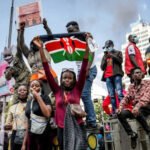More than 13,000 cases of measles have been recorded in the Democratic Republic of Congo (DRC) since January 2021, according to Doctors Without Borders/Médecins Sans Frontières (MSF).
Measles is a viral disease spread by coughing, sneezing or through direct contact with nasal or laryngeal secretions.
Children with the disease can face severe complications, as measles ‘erases’ their immune memory, putting their health and lives at risk for years to come.
Between 2018 and 2020, more than 460,000 children contracted the disease and nearly 8,000 died from it. Three-quarters of them were under five.
It is understood that at the time, MSF deployed emergency teams in 22 of the 26 provinces, tracking virus hotpots, treating 90,000 patients and vaccinating more than 2.3 million children.
‘Unfortunately, since the end of 2020, several provinces have started recording new increases in patients with measles, notably the North and South Ubangi provinces’, Coordinator of MSF’s emergency response team in the DRC, Anthony Kergosien, said.
‘We had to urgently send mobile response teams again to help stem the progression and save as many lives as possible’.
MSF said it sent a team to the Bogose-Nubea health zone in South Ubangi last December and found massive needs.
‘We vaccinated 70,000 children, quickly halting the spread of the disease. The team then headed to the neighbouring province of North Ubangi, where the Bosobolo health zone was also in critical condition’, MSF said in a statement.
MSF said it also launched a vaccination campaign for 66,000 children in this isolated health zone and the work is ongoing with a focus on those living in hard-to-reach areas.
‘Our teams also trained local health workers in disease surveillance to improve the early detection of new measles outbreaks’, the statement added.
‘However, like many other health zones in DRC, the resources available to local health authorities fall far short of what is needed’.
Efforts to curb the spread of the disease face enormous challenges as a national vaccination and surveillance programme has been hampered by major weaknesses – a very high birth rate that exposes new children to the disease every day; an under-equipped health system is unable to ensure consistent quality healthcare; and health providers trying to access certain regions must overcome entrenched geographic and security difficulties.
According MSF, working to overcome these challenges is key to tackling measles in the long-term.
Source: MSF
Photo source: U.S. Army Africa






